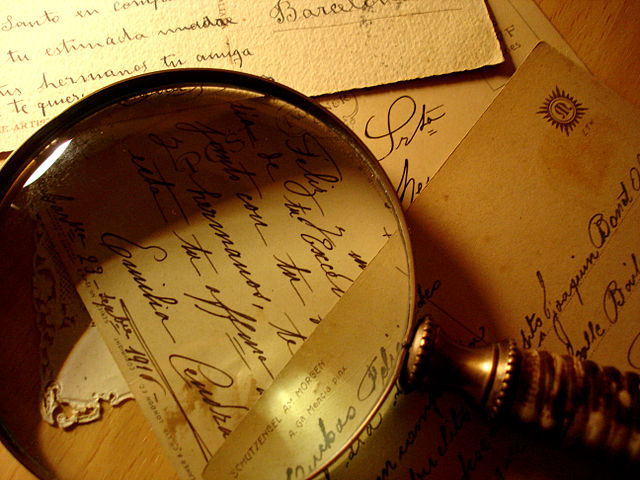
During my current re-read of Gaudy Night I started to think about the mystery genre in general and myself as a reader of mysteries in particular. I’ve read a lot of mystery novels in my life. I like the genre. Or at least I like a lot of mystery novelists: I’ve read Dorothy Sayers and Agatha Christie, Elizabeth Peters, Josephine Tey, P.D. James, Laurie King, Peter Tremayne, Anne Perry, and of course Arthur Conan Doyle’s Sherlock Holmes. But the odd thing is that I tend to read mysteries mostly for the frame narrative of the detective’s personal life. I don’t get very invested in the mystery itself, the whodunnit. And yet. . . I return to certain mystery novelists again and again because there is something in the genre I find deeply satisfying.
I think it was Dorothy Sayers herself, though it might have been a different writer, who argued that the mystery novel is a deeply moral novel because its very structured is ordered to crime being punished. Good is good and evil is evil. Or at least that’s how I remember the argument going. I googled and found this quote from Lord Peter Wimsey in Thrones and Dominations, the novel that was published after Sayers’ death, reconstructed from her notes by Jill Patton Walsh:
Detective stories keep alive a view of the world which ought to be true. Of course, people read them for fun, for diversion, as they do crossword puzzles. But underneath they feel a hunger for justice, and heaven help us if ordinary people cease to feel that.
And yet I don’t think it’s just the hunger for justice, though that is definitely a part of it. I think it’s more about there being a moral order to the universe, of which justice is a major component. And yet the genre often carves out room for mercy as well as justice.
But I don’t think that deep structure is what makes them so fun to read. There’s something else as well. Mystery novelists tend to be interested in people, how and why they think and act, and in the reasons why people sin. And that deep interest in motivation leads the really good mystery novelists to write interesting people and interesting situations. But it’s really the detective who usually draws me in and keeps me coming back. The detective and his or her relationship to other people and to the world.
I’m currently binge watching the tv series Bones on Amazon Prime. And I really don’t like the gruesome dead bodies, at all. But I love the structure of the procedural and the way it provides a framework for relationships to develop and change gradually over time. I really appreciate the way the various romances and friendships grow and change and develop slowly, not rushing. Sometimes I wish the characters would rush a bit, but then I think again and realize how satisfying it is to see them hesitate, move forward, move back… it feels authentic to how people really interact. And again, there’s a deep moral core to the show. Which doesn’t mean the characters are all deeply moral in their choices. But does mean that we get to see the real consequences of people making bad choices and learning from their mistakes. And it’s a world where those choices matter. I also really love the commentary you start to get from various interns in later seasons who comment on how the main characters in the show are much too interested in each other’s personal life and fail to act like professionals.
In any case, police procedurals as a subgenre of mystery have the same sorts of features and it’s curious to me to see how here too I’m invested both in the deep structure of the moral universe and in the personal lives of the protagonists.

I think that I stopped reading novels in the 1980’s because they were populated with depressed, disturbed characters. I couldn’t understand the mindset or the morals or, possibly, the problems of the characters. For an entire decade I only read non-fiction. Then I discovered mysteries and spy stories, beginning with Ross McDonald, Eric Ambler. It was deeply satisfying to have good win out while being tantalized with various possible suspects. McDonald was a pro at characterizations and motives.
Readable novels, minus the bizarre qualities, returned in the last 15-20 years, but now it seems it is a race to inject as many politically correct characters as possible to be able to get novels published. Long-time authors have begun to add homosexuals as the honorable characters while referring to patriots and religious characters as having personality disorders. This is creeping into the mystery genre also.
I may have to resort to re-reading old classics.
I mostly read older books, seldom recently published, unless recommended by a friend whose taste I trust. Or by a handful of authors I trust.
I’ve been re-reading Dorothy Sayers and I love her mysteries. Josephine Tey is another favorite. I like Laurie King’s Beekeeper’s Apprentice and a few of the sequels, but I stopped reading after a few books. There are so many great classics to read that I don’t see the point of reading mediocre new fiction. And I have cultivated a group of friends who are do clue me in to an occasional new novel that is worth reading. Much safer and less frustrating than just browsing the library shelves and hoping.